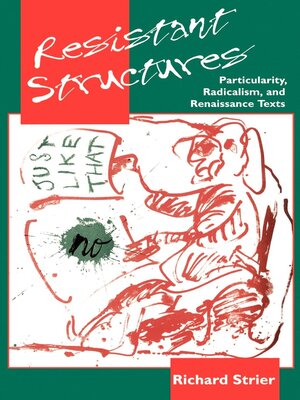Resistant Structures
ebook ∣ Particularity, Radicalism, and Renaissance Texts · The New Historicism: Studies in Cultural Poetics
By Richard Strier

Sign up to save your library
With an OverDrive account, you can save your favorite libraries for at-a-glance information about availability. Find out more about OverDrive accounts.
Find this title in Libby, the library reading app by OverDrive.



Search for a digital library with this title
Title found at these libraries:
| Library Name | Distance |
|---|---|
| Loading... |
Taking Wittgenstein's "Don't think, but look" as his motto, Richard Strier argues against the application of a priori schemes to Renaissance (and all) texts. He argues for the possibility and desirability of rigorously attentive but "pre-theoretical" reading. His approach privileges particularity and attempts to respect the "resistant structures" of texts. He opposes theories, critical and historical, that dictate in advance what texts must—or cannot—say or do.
The first part of the book, "Against Schemes," demonstrates, in discussions of Rosemond Tuve, Stephen Greenblatt, and Stanley Fish among others, how both historicist and purely theoretical approaches can equally produce distortion of particulars. The second part, "Against Received Ideas," shows how a variety of texts (by Shakespeare, Donne, Herbert, and others) have been seen through the lenses of fixed, mainly conservative ideas in ways that have obscured their actual, surprising, and sometimes surprisingly radical content.
Taking Wittgenstein's "Don't think, but look" as his motto, Richard Strier argues against the application of a priori schemes to Renaissance (and all) texts. He argues for the possibility and desirability of rigorously attentive but "pre-theoretical" read
The first part of the book, "Against Schemes," demonstrates, in discussions of Rosemond Tuve, Stephen Greenblatt, and Stanley Fish among others, how both historicist and purely theoretical approaches can equally produce distortion of particulars. The second part, "Against Received Ideas," shows how a variety of texts (by Shakespeare, Donne, Herbert, and others) have been seen through the lenses of fixed, mainly conservative ideas in ways that have obscured their actual, surprising, and sometimes surprisingly radical content.
Taking Wittgenstein's "Don't think, but look" as his motto, Richard Strier argues against the application of a priori schemes to Renaissance (and all) texts. He argues for the possibility and desirability of rigorously attentive but "pre-theoretical" read







